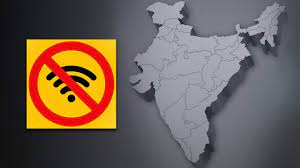By M.Y.Siddiqui
India has topped Internet shutdowns in the world for the fourth consecutive years ending December 2021, a latest report by tech policy think tank Access Now revealed. During 2021, 106 of the 182 internet shutdowns reported globally were in India. Of the total internet shutdowns in the country in 2021, Jammu and Kashmir faced intermittent internet clampdown despite the longest ever shutdowns there were already lifted in February 2021. Last five years from 2016 to 2021, India faced varying Internet shutdowns in 567 cases, more than half of the 931 Internet shutdowns recorded globally. Global count of Internet shutdowns dipped in 2020 because of the pandemic. It rose in 2021.
Every Internet shutdown comes with a heavy costs. It is generally counterproductive, resulting in resentment, rebellion of people from loss of connectivity, loss of livelihoods, loss of businesses, loss of educational access. Indian economy got a severe hit during 2021 on account of Internet shutdowns. Losses were of the order of US $583 million. As defined by Access Now, Internet shutdown is an intentional disruption, making Internet communications inaccessible or effectively unusable for at least an hour. In many countries, governments impose such shutdowns to suppress dissent, silence critics and control the flow of information during social or other disturbances or elections.
India accounted for majority of Internet shutdowns in the last five years. Number of recorded internet shutdowns from 2016 to 2021 showed India effected 567 shutdowns followed by Pakistan 40, Yemen 27, Iraq 24, Ethiopia 23, Myanmar 19, Venezuela 14, Bangladesh 12, Sudan and Algeria 11 each, bracketing India with mostly undemocratic countries, thus demolishing the façade of the rule of law based constitutional democratic governance in our country. This also indicates India is an electoral autocracy where people are treated as subjects as in feudal autocracy where people are dependent on arbitrary whims and fancies of the ruler. Internet shut down is intentional disruption of the Internet or electronic communications rendering them inaccessible or effectively unusable for a specific population or within a location often to exert control over the flow of information. A shutdown can be of varying lengths lasting for a minimum of one hour to even several years.
Out of the number of recorded Internet suspensions from 2016 to 2021, Jammu and Kashmir registered 378 Internet blackouts followed by Rajasthan 52, Uttar Pradesh 23 and Maharashtra 12. Jammu and Kashmir (J&K) borne the brunt of the Internet shutdowns. In 2021 also, out of the 106 shutdowns, 85 were in J&K, less than 93 shutdowns recorded in 2020. It was more than 81 recorded in 2019. Pulwama, Srinagar and Kulgam were the worst affected districts in 2021 with services disrupted over 30 times. According to the government, most of these shutdowns were ordered for counter-terrorism measures to quell unrest and keep anti-national elements in control.
India recorded the longest ever high-speed Internet blockade continuously for 550 days in J&K after 4G services were restored in February 2021. Services were snapped following read down of Article 370 ending special arrangements with J&K on August 5, 2019. Blockades were recorded in National Capital Region and parts of Haryana. J&K lost around $420 million during 2012-2017 on account of Internet shutdowns. Indian Council for Research on International Economic Relations reported this. It hurt tourism and e-commerce in J&K. Despite the Central Government claim that clampdown on Internet in J&K had reduced terrorism, external data suggested otherwise.
Internet shutdowns have serious economic and social ramifications. It cost India $583 million in 2021 alone, as reported byTop10VPN, a global digital privacy and research group. The research is based on a 2016 study, which estimated that India lost about $968 million due to shutdowns between July 2015 and June 2016. Long Internet ban in J&K overlapped with the first wave of Covid-19, affecting access to healthcare and education. Quarantined patients could not get in touch with their families; contact tracing was hindered with physicians struggling to communicate. Online classes were difficult as bandwidth was curtailed. J
Experts say, “Internet shutdown cannot be justified in any situation as it has a disproportionate impact on fundamental rights”. In January 2020, the Supreme Court of India declared access to the Internet as a fundamental right. There is no evidence that Internet shutdowns are effective, said the apex court. According to a Parliamentary Standing Committee report in December 2021, only J&K, Delhi, Kerala and Bihar submitted written records of Internet shutdowns in 2020. The Parliamentary Standing Committee also expressed its displeasure at the Union Government’s lack of awareness about following the standard operating procedures while imposing Internet suspensions.
In view of the foregoing, it appears democracy and rule of law based system of constitutional system of governance in the country has been subverted under the current autocratic Union Government where decisions are taken without considerations of people’s fundamental rights to deprive them of their livelihoods and other wherewithal and progress. Internet shutdowns are anti-people measures intended to deny the people of their democratic fundamental rights to dissent, liberty, life and livelihoods. This must stop!
Powered by Froala Editor




LEAVE A REPLY